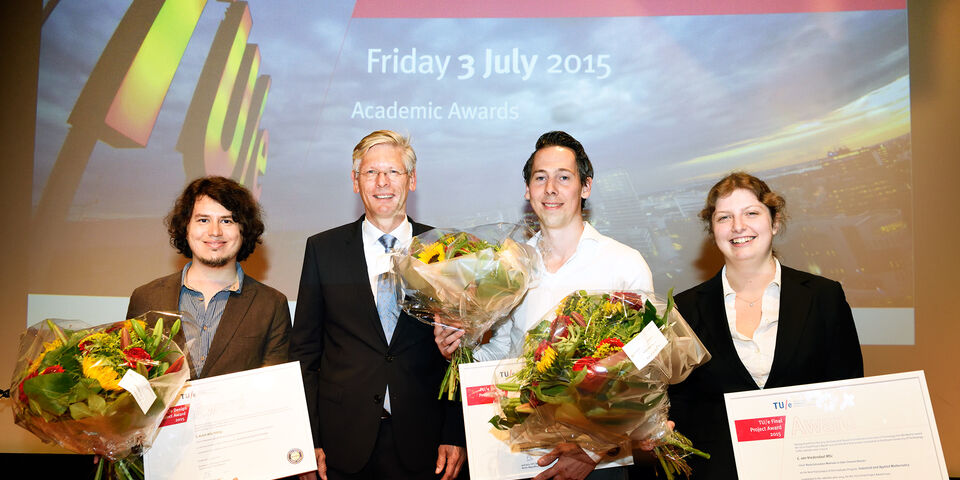Best PhD candidate, best PDEng candidate and best graduate
Sjors Schellekens can call himself the best PhD candidate of TU/e, Christine van Vredendaal made the best final project and the winner of the best design project is Serkan Külah. The awards for the Doctoral Award, Final Project Award and the Design Project Award were presented this afternoon in the Blauwe Zaal.
Doctoral Award
According to the jury, the best doctoral work was delivered by physicist Sjors Schellekens, who obtained his PhD in April 2014 cum laude. Sjors Schellekens has worked on two alternative methods to increase the speed at which data can be stored, although the most important reason for his research was to gain a fundamental understanding of magnetism on extremely short time scales. One of these methods uses very high-speed laser pulses to change the magnetic properties of a material. The other is based on the use of an electric field to control data flows in a high-speed ‘racetrack memory’. In this type of memory, the data travels along very thin tracks past static read/write heads. The jury decision favoring his work was unanimous and said it was ‘the most excellent of the excellent theses’. Schellekens now works as a researcher at Océ Technologies.
Final Project Award
Christine van Vredendaal, by now a PhD candidate at Mathematics and Computer Science, received the Final Project Award. She graduated cum laude in the summer of 2014. Christine van Vredendaal’s work belongs to the field of cryptography and security, and in particular to security evaluation of smart cards in extremely hostile environments. In her final project she studied the evaluation of smart cards under so‐called side channel attacks. These attacks are a powerful tool to discover the cryptographic secrets of a chip or device. She showed convincingly how to make these evaluations significantly more efficient and meaningful, significantly reducing time for measurements as well as for computation, and leading to much better security guarantees of the smart card if it passes evaluation. The jury commends the high scientific quality of her work and the importance of the practical application.
Design Project Award
Serkan Külah made the best design project. Serkan concentrated on the further development of a so-called virtual cylinder pressure sensor, developed by TNO. This sensor should minimize systems costs of the fuel flexible control system, which is essential for a successful introduction in the automotive market. By following a system engineering approach, Serkan contributed to specifying the business case and the hardware and software requirements. Furthermore, he managed to extend the virtual sensor concept to be suitable for realistic, highly dynamic engine operation conditions and to apply it for the first time to a novel dual-fuel combustion concept. With the implementation of a prototype, he also demonstrated the feasibility of this concept. Külah followed the design engineer program Automotive System Design and is now a junior researcher at TNO Automotive. In the jury report Külah is praised for his creativity and for his skill in combining an academic endeavor with a practical application.
Ten Master students were nominated for the Final Project Award, ten PhD candidates for the best Doctoral Award and nine PDEng candidates competed for the best Design Project. The winners of the Doctoral and the Design awards each receive 5,000 euro; the final Doctoral Award is worth 2,500 euro. In addition, all nominees are given a financial bonus of 250 euro.


Discussion